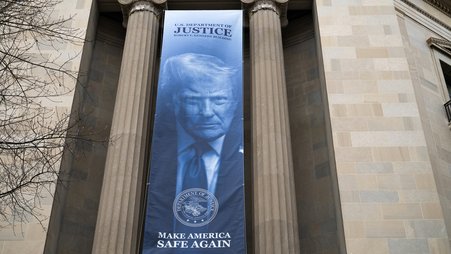Dear Friend of Press Freedom,
This week, we take a look back at Trump 2.0’s first 100 days — and catch us live May 2, 2025, at 1 p.m. Eastern time for a discussion on the administration’s unprecedented attack on law firms and what they mean for the press.
100 days, 100 attacks on the press, and counting
The second Trump administration’s 100th day came and went this week, but the attacks on the press and transparency kept coming.
Our U.S. Press Freedom Tracker has a recap of some of the major press freedom violations it’s documented so far. We also put together a list of 100 times President Donald Trump and his team targeted the Fourth Estate. Here it is on Bluesky and X.
It’s alarming how easy it was to get to that number. Before the ink dried, there were a couple more, including Trump’s ludicrous threat to sue The New York Times for “tortious interference” for quoting legal experts on the weakness of his frivolous shakedown of a lawsuit against CBS News.
And to combat the excessive secrecy that defined this administration’s first few months, we also launched The Classified Catalog, a secrecy news tracker to help the public hold the government accountable.
Department of Justice repeals protections for journalist-source confidentiality
Attorney General Pam Bondi has rescinded her predecessor’s policy restricting federal prosecutors from forcing journalists to reveal sources.
As Freedom of the Press Foundation (FPF) Director of Advocacy Seth Stern said, “Everyone predicted this would happen in a second Trump administration, yet politicians in a position to prevent it prioritized empty rhetoric over putting up a meaningful fight.” Read our full statement.
Using public records to break through the secrecy of the Texas prison system
Our series highlighting local journalists using public records to speak truth to power continues with a profile of Michelle Pitcher, a reporter at the Texas Observer who focuses on criminal justice.
Public records alone can’t tell the story, though — only those living it can. “As journalists, we should be seeking the people who are willing to tell those stories because no one wants to feel like they’re shouting into the abyss. And people are shouting. People do want to talk,” Pitcher said. Read more here.
Rural America needs public media
We partnered with Reporters Without Borders (RSF) and the Committee to Protect Journalists to lead a letter urging congressional leadership to reject the White House’s request to rescind funds appropriated to the Corporation for Public Broadcasting.
The letter explains that “the harm of these cuts will disproportionately befall rural American communities. Less densely populated parts of the country tend to have fewer options for reliable news sources. ... When people lose access to their local media, they’re forced to turn instead to national media, which are less attuned to the needs of their communities.” Read the letter here.
What we’re reading
100 days of attacks on transparency and the press (The Dissenter). FPF’s Seth Stern and Daniel Ellsberg Chair on Government Secrecy Lauren Harper joined The Dissenter’s podcast to talk about the state of press freedom and transparency 100 days into Trump 2.0.
Alarm bells: Trump’s first 100 days ramp up fear for the press, democracy (Committee to Protect Journalists). “I really think we’re just beginning to understand the impact of, for example, removing the AP’s access, and what that will do to local news organizations,” said Kirstin McCudden, Managing Editor of our U.S. Press Freedom Tracker.
Trump’s war on the press: 10 numbers from the US President’s first 100 days (Reporters Without Borders ). RSF lays out 10 key numbers that illustrate the administration’s unconstitutional assaults on press freedom and the right to reliable information.
Trump v. 60 Minutes is a stunning battle for the soul of US media (The Guardian). “In addition to all the principled reasons to not cave to Trump, there’s also the practical one that it doesn’t work,” Stern explained to The Guardian. “He will be right back at your door with his hands out the next day.”
Democrats had a shot at protecting journalists from Trump. They blew it (The Intercept). “Last year, Senate Democrats had a clear opportunity to make basic protections for journalists a matter of binding federal law, rather than mere policy that could be undone with a vendetta-laced memo … then Democratic leaders blew it.”
The legal battle for DOGE transparency (Columbia Journalism Review). “More transparency means less corruption and potential for state capture. It’s an existential issue, and not one that our federal records laws or the people in the bureaucracy are equipped to deal with,” Harper told CJR.
US attorney for DC accuses Wikipedia of ‘propaganda,’ threatens nonprofit status (The Washington Post). Practically everything Ed Martin says is nonsense, but the one thing that’s totally believable is he doesn’t know federal prosecutors don’t investigate nonprofits’ tax compliance.





